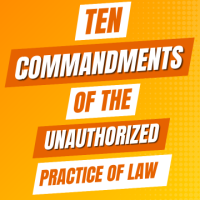Ten Commandments of the Unauthorized Practice of Law
 Recently the Illinois Attorney General reached out to the IPA to make us aware of an investigation they are conducting regarding a complaint they received about a group that may be engaging in the unauthorized practice of law or UPL. As many of us know, there are serious consequences that can come about when a paralegal engages in UPL including fines and even jail time. We thought we would take the opportunity to bring you our version of the 10 Commandments as a reminder of some of the most important items to keep in mind.
Recently the Illinois Attorney General reached out to the IPA to make us aware of an investigation they are conducting regarding a complaint they received about a group that may be engaging in the unauthorized practice of law or UPL. As many of us know, there are serious consequences that can come about when a paralegal engages in UPL including fines and even jail time. We thought we would take the opportunity to bring you our version of the 10 Commandments as a reminder of some of the most important items to keep in mind.
1. THOU SHALL NOT GIVE LEGAL ADVICE.
Paralegals cannot interpret laws, offer opinions on legal matters or recommend a course of action to their firm's clients. The exception to this rule is that you can advise your clients to just sit tight until you talk to your supervising attorney. Even a seemingly harmless piece of advice can be construed as UPL.
2. THOU SHALL NOT SET OR NEGOTIATE LEGAL FEES.
Again, in certain jurisdictions, non-attorneys engage clients directly, this is not the case in Illinois. Paralegals are not allowed to determine, quote or negotiate legal fees and billing with clients. This is the responsibility of the attorney.
3. THOU SHALL NOT REPRESENT CLIENTS IN COURT.
While there are some government agencies that do allow non-attorneys to represent clients, only licensed attorneys can formally represent clients in court or at a deposition. While paralegals are often asked to assist with the preparation, they cannot speak on behalf of a client in a courtroom setting.
4. THOU SHALL NOT ESTABLISH ATTORNEY-CLIENT RELATIONSHIPS.
While the rules of this have changed in certain jurisdictions that have licenses such as the LLLT which allow non-attorneys to engage with clients directly, here in Illinois any formal relationship between a client and attorney must be established by the attorney, not the paralegal. You can provide forms and set them up as a client, but the actual engagement itself must be approved by the attorney.
5. THOU SHALL NOT TAKE SOLE RESPONSIBILITY FOR OR SIGN LEGAL DOCUMENTS.
Preparing pleadings, motions or contracts without attorney review and authorization, even if they are routine, is not allowed. These must be reviewed and approved by an attorney before submission. Also, paralegals cannot sign pleadings, motions, contracts, or other documents requiring an attorney’s signature, even if they prepared them.
6. THOU SHALL NOT MISREPRESENT YOURSELF AS AN ATTORNEY.
If you work as a paralegal for an extended period of time, there is bound to be a time in your career where you will be mistaken for an attorney. Whenever speaking with clients, opposing or co-counsel and court personnel, always identify yourself as a paralegal. Always make sure that your title is included on business cards, letterhead and signature lines on letters and emails.
7. THOU SHALL AVOID PROVIDING INDEPENDENT LEGAL JUDGMENT.
You may think this is the same thing as in number (2) above, but there is a difference. Paralegals exercise discretion and professional judgement with their delegated tasks; we cannot substitute our judgment for that of a licensed attorney. An example of this would be when a client asks, "do you think I will win my case?" No matter what my opinion was on the matter, we would suggest that they should discuss with the supervising attorney.
8. THOU SHALL MAINTAIN STRICT CONFIDENTIALITY.
Paralegals are privy to sensitive client information and no matter how juicy the case is, it is our responsibility to maintain confidentiality and respect attorney-client privilege. This includes talking to your family and friends about the specific of cases that are not a matter of public knowledge. During the course of your career, your firm may represent some very affluent and/or famous people and while it can be a great source of pillow talk with a spouse or gossip to share with friends, it is imperative that we keep this information to ourselves. Sharing confidential information with unauthorized individuals can have serious consequences.
9. THOU SHALL NOT ADVERTISE LEGAL SERVICES
As we mentioned above, some jurisdictions allow representation of clients by non-attorneys, Illinois is not one of those states at this time. Some paralegals do freelance work by providing their services to licensed attorneys. Linda Maiorano, our Freelance Section Chair, suggests that if you are advertising your services at a paralegal, you should always include a disclaimer on your website and marketing materials stating that you cannot offer legal services to the general public and only to licensed attorneys in good standing so not to create confusion and risks unauthorized practice of law (UPL).
10. THOU SHALL PURSUE CONTINUING EDUCATION AND STAY UP TO DATE.
The law is constantly evolving and just like attorneys, paralegals should engage in continuing legal education to stay informed about legal regulations, ethical guidelines and legal procedures in the jurisdictions that your firm practices. This will not only help to protect yourself from ethical issues in your career, but it can also make you a more valuable asset to your attorneys and firms. That being said, make sure that you register for our upcoming Fall Education Conference on October 29, 2025. Registration is open now!
Jennifer Fryer, IPA Director
Melissa Jurik, IPA Director